
Introduction to Financial Management (KSIHFW)
Financial Management involves the planning, organizing, directing, and controlling of financial activities, particularly related to the procurement and effective utilization of funds. This session focuses on the Financial Management of Government Institutions, where the government allocates funds for the implementation of various programs through its agencies and institutions.

Government Vehicle Management (KSIHFW)
This course provides an overview of the records and registers maintained in connection with the use of government vehicles. It outlines the responsibilities of controlling officers and drivers, and emphasizes proper practices through a clear explanation of the dos and don’ts. The unit also aims to familiarize participants with relevant government orders and circulars governing the usage and maintenance of government vehicles.

DISCIPLINARY PROCEDURES (KSIHFW)
In executing official duties the Government servants has to comply with the rule of conduct made by the Government. The Kerala Civil Service Rules (C.C.A) Rules 1960 deals with the procedures to be followed in penalizing those Government servants who breaches the provisions in the Conduct Rules 1960.
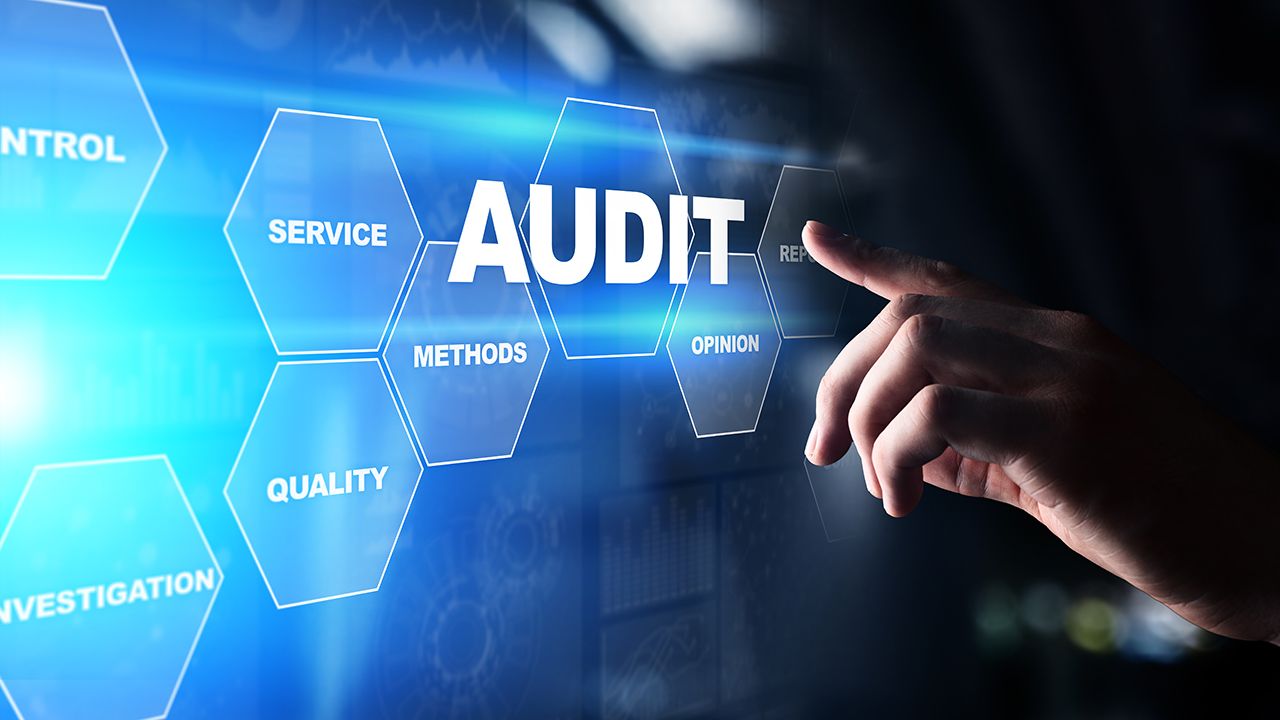
AUDIT ISSUES
AUDIT ISSUES
Unit description / About the Unit: Audit is an examination of accounts to ascertain whether the expenditure actually incurred under various grants is within the authorisation given under the provisions of the Legislature. It also ascertains whether the expenditure so incurred is in conformity with the Law, relevant rules and regulations issued by Government from time to time.
Target population/ Participants: Heath Services Department
Objective of the Unit: By the end of the unit the participant gains knowledge regarding the importance of follow the guidelines and rules issued by the Government from time to time.
Instructional language: Malayalam, English
Materials attached: Nil
Duration of the unit: 1hour and 17 minutes
SESSION DISTRIBUTION OF THE UNIT
|
SESSION |
TOPIC |
DURATION |
FACULTY |
|
|
1 |
SESSION I |
Clearance of Accountant General’s Audit Paras – Part I |
23 Min. 34 Sec. |
Sri. Sudheer P.S. |
|
2 |
SESSION II |
Clearance of Accountant General’s Audit Paras – Part II |
26 Min. 01 Sec. |
|
|
3 |
SESSION III |
Guidelines on Time Bound Higher Grade Promotions – Part III |
27 Min. 49 Sec |
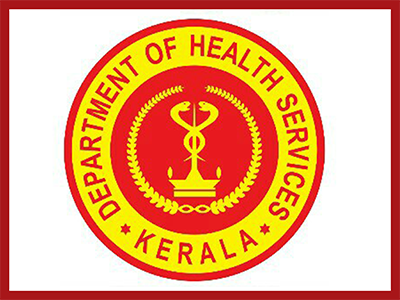
Organisational structure of health services - KSIHFW
The Health Services department performs the chief function of delivery of health care in a wholesome manner. Preventive and promotive healthcare in addition to the routine curative services and rehabilitation aspects of healthcare constitute the main activities of the department. The activities include the establishment and maintenance of medical institutions with necessary infrastructure, control of communicable diseases, rendering of Family Welfare services including Maternal and Child Health Services, implementation of National Control / Eradication programs providing curative services and administration. The staff of the department should be aware of the organizational structure of the department as well as the various activities.

Soft skill development course - KSIHFW
Soft skills are important for personal and professional success. Here are some courses that can help you develop your soft skills:
-
Communication Skills: Effective communication is essential for success in any field. This type of course focuses on developing effective communication skills, both verbal and non-verbal, and includes topics such as active listening, empathy, and persuasive speaking.
-
Leadership: Leadership skills are important for those who want to lead and manage teams.
-
Time Management: Time management is another important skill that can help you be more productive and achieve your goals.
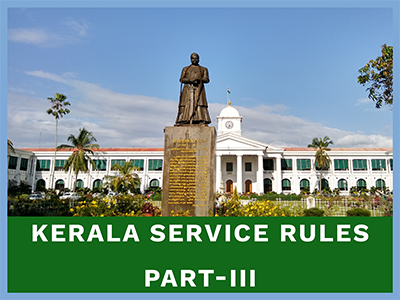
Kerala Service Rules Part - III
The Kerala Service Rules were issued by the Governor of Kerala under the powers conferred on him by the proviso to Article 309 of the Constitution of India and published under Notification No. Fin/CR.57702/59 dated November 10, 1959, in the Kerala Gazette Extra Ordinary No. 67 dated November 12, 1959. Later, on September 17, 1968, the Kerala Legislative Assembly passed the "Public Service Act 19" for the conditions of service of government employees, and since then the Kerala Service Rules have been governed by that Act. The Supreme Court in SLP (C) No. 9425/1984 held that Pension is a valuable right of an officer in recognition of the satisfactory discharge of duties and responsibilities while in service. As per Rule 12(24) of KSRs Part –I, Pension includes Monthly Pension, Gratuity, and Death-cum-Retirement Gratuity. Future good conduct is an implied condition for every grant of a pension. R 2 (A) & 90 (12) Part III. No Pension or Gratuity or DCR Gratuity will be paid in the case of resignation, dismissal or removal from service. R 29 (a) & (b) P-III The present Pension Rules (Simplified Pension Rules) were introduced with effect from 14/11/1966. These rules apply to all officers who entered the service of Kerala State on or after November 1st, 1956. The Kerala Service Rules are a unified set of rules to regulate the service conditions of the employees in the State of Kerala. The government of Kerala introduced those rules under the proviso to Art. 309 of the Constitution of India with effect from 1.11.1959. The Part III contains rules relating to Pension. After the introduction of these rules, the government issued various amendments and several executive orders by way of directions, interpretations, and clarifications to the KSR. The rules in Part III shall be deemed to have come into force on November 1st, 1956. Part three contains Rules 1 to 151, focusing on the Pension Rules. The present Pension Rules, viz, Simplified Pension Rules, are in force from 1411-1966.
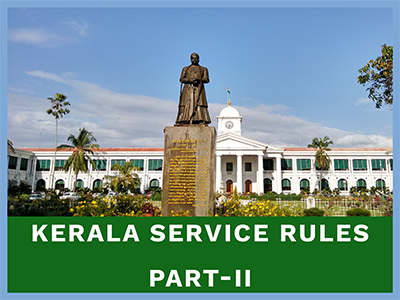
Kerala Service Rules Part - II
The Kerala Service Rules were issued by the Governor of Kerala under the powers conferred on him by the proviso to Article 309 of the Constitution of India and published under Notification No. Fin/CR.57702/59 dated November 10, 1959, in the Kerala Gazette Extra Ordinary No. 67 dated November 12, 1959. Later, on September 17, 1968, the Kerala Legislative Assembly passed the "Public Service Act 19" for the conditions of service of government employees, and since then the Kerala Service Rules have been governed by that Act. The employees appointed against the permanent vacancies arising in the Kerala state government service are governed by a set of rules named as the Kerala State Service and Subordinate Rules. Each member of the service should know the terms and conditions mentioned in each of the sections of the various volumes of KSR. Knowledge regarding the details mentioned in the KSR will help in saving time and creating unnecessary confusions. These rules apply to all officers who entered the service of Kerala State on or after November 1st, 1956. The Kerala Service Rules are a unified set of rules to regulate the service conditions of the employees in the State of Kerala. The government of Kerala introduced those rules under the proviso to Art. 309 of the Constitution of India with effect from 1.11.1959. The Part II contains rules relating to travel allowances. The rules in Part II shall be deemed to have come into force with effect from November 1, 1959. Part two, Rules 1 to 116, focuses on the Travel Allowance Rules.
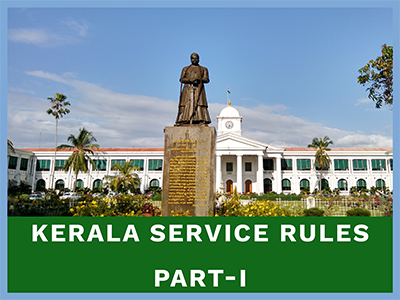
Kerala Service Rules Part - I
The Kerala Service Rules were issued by the Governor of Kerala under the powers conferred on him by the proviso to Article 309 of the Constitution of India and published under Notification No. Fin/CR.57702/59 dated November 10, 1959, in the Kerala Gazette Extra Ordinary No. 67 dated November 12, 1959.
Later, on September 17, 1968, the Kerala Legislative Assembly passed the "Public Service Act 19" for the conditions of service of government employees, and since then the Kerala Service Rules have been governed by that Act.
These rules apply to all officers who entered the service of Kerala State on or after November 1st, 1956. The Kerala Service Rules are a unified set of rules to regulate the service conditions of the employees in the State of Kerala. The government of Kerala introduced those rules under the proviso to Art. 309 of the Constitution of India with effect from 1.11.1959. The Kerala Service Rules contain three parts. Part I contains rules relating to pay, leave, joining time, foreign service, etc. The rules in Part I shall be deemed to have come into force with effect from November 1, 1959. Part one contains Rules 1 to 159 - focusing on General conditions of service and rules on Pay, Leave, Joining Time, and Foreign Service
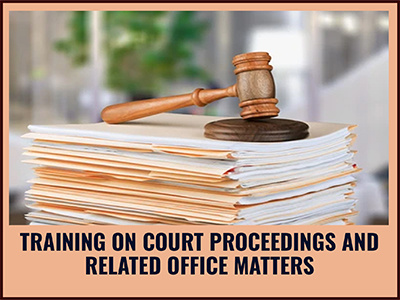
TRAINING ON COURT PROCEEDINGS AND RELATED OFFICE MATTERS
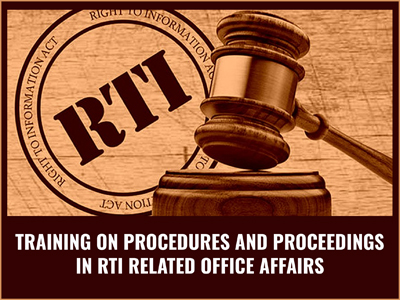
TRAINING ON PROCEDURES AND PROCEEDINGS IN RTI RELATED OFFICE AFFAIRS
The right to Information Act 2005 mandates timely response to citizen requests for government information. The basic object of the Right to Information Act is to empower the citizens, promote transparency and accountability in the working of the Government, contain corruption, and make our democracy work for the people in a real sense. It goes without saying that an informed citizen is better equipped to keep necessary vigil on the instruments of governance and make the government more accountable to the governed. Institutions under the health department also receive many applications under the scope of RTI act. This course helps officers in the department to make a clearer idea on the procedures and proceedings related to RTI-related office affairs.
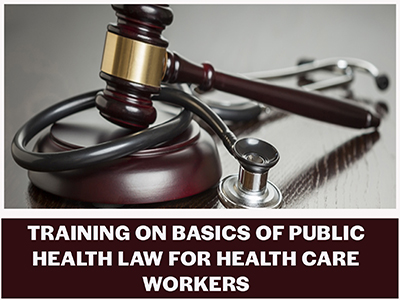
BASICS OF PUBLIC HEALTH LAW FOR HEALTH CARE WORKERS
Public health law integrates concepts from the law, medicine, health care, and public health. Public health law focused on public health issues with legal nature. Public health law and public health policy are fundamental tools that assist states in the task of protecting people from threats to health, preventing disease, and striving for healthy populations. This short course provides a knowledge update to the participants regarding public health in practice and its different applications.
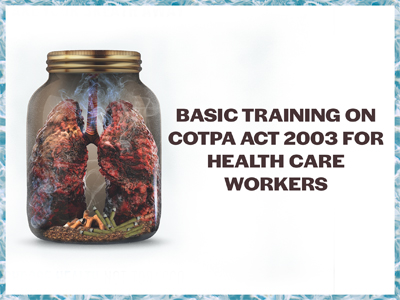
Basic training on COTP Act for health care workers
A short course in the learning management system on COTP Act enables the health care workers to acquire knowledge regarding the various theoretical and practice aspects of the COTP Act. The training program contains 5 video lecture sessions and is equipped with a pre-test and post-test. Scoring of a minimum of 50 in post-test will be rewarded with a certificate.
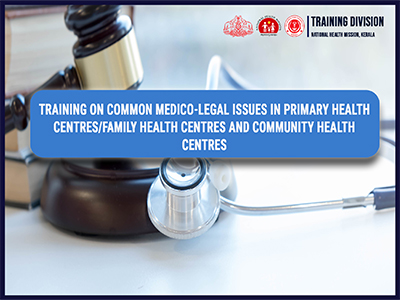
COMMON MEDICO-LEGAL ISSUES IN PRIMARY HEALTH CENTRES/FAMILY HEALTH CENTRES AND COMMUNITY HEALTH CENTRES
In primary health care institutions different medico legal cases make issues during examinations and certifications. The contents are organized in three sessions which explains types of medico legal certifications and examinations, examinations and certifications related to wounds and injuries and examinations and certifications of drunkenness and sexual offenses.